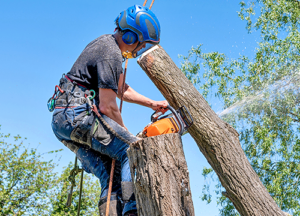The overhead garage door is one of the first things homebuyers notice. It also plays a critical role in the home’s curb appeal and energy efficiency.
Garage doors can last a long time if properly maintained. Usage and local climate influence their life span. It’s important to choose the best material for your geographic region. Click Here to learn more.

For as long as there have been cars, people have wanted to keep them safe and secure. That’s why garages have been around for thousands of years. However, The earliest garages were not the ones we use today. Instead, they were structures that resembled gatehouses. These ancient buildings were used for many things, including storing Roman chariots. Since these chariots were large and heavy, they needed to be locked up securely. The steel gates that were installed in these gate houses were probably the ancestors of today’s garage doors.
During the early 1900s, when cars became more common and affordable, people started to want places of their own to keep them. At that time, most people could afford to buy only one car, so they would store it in a carriage house, which was similar to a shed and featured two barn-like doors that swung out like traditional doors. However, these doors posed several problems: they were difficult to open if they were blocked by snow or any other impediment, they opened and closed constantly, and they put a lot of wear and tear on the hinges and moving parts.
Then, in 1921, a man named C.G. Johnson came up with the idea to make a better, more convenient garage door. His design was a huge step forward: it consisted of panels that folded upward, making them easier to lift and allowing the garage door to be parallel to the ceiling when it was open. This was a much more secure way to store your car, and it made the garage more useful as well.
Overhead doors were soon available in homes throughout the country, and they quickly became a necessity for most car owners. By 1925, real estate agents were reporting that houses wouldn’t sell unless they had a garage attached to them. As a result, the Overhead Door Corporation was founded and sales began to skyrocket.
Since then, garage doors have come a long way. They’ve evolved from basic structures meant for practical purposes to high-tech components that are integral to the safety and security of most modern households. But while these advancements have been amazing, they’re only a small part of the story. Here are some of the other ways that garage doors have changed through the ages:
Materials
Steel garage doors are the most popular option for many homeowners due to their durability, security and variety of design options. The material is also cost-effective and offers a high level of insulation. It is available in a wide range of styles and finishes including wood-grain textures. In addition, steel is incredibly durable and resistant to harsh weather conditions. Its versatility allows for a range of design and color options to match the home’s exterior. Many models feature windows for added light and curb appeal. Steel garage doors are also a good choice for homes located in wind load zones as they may qualify for insurance discounts.
Aluminum doors are another popular option for their modern aesthetics and lightweight nature. They are easy to clean and maintain, requiring less maintenance than other materials. They can be painted or gel stained to match the home’s exterior. They are particularly favored in coastal regions for their corrosion resistance. However, they may not offer as much insulation as other options and can be vulnerable to dents.
Fiberglass garage doors offer a more natural look than steel or aluminum while retaining their strength and longevity. They can be designed with windows, letting in natural light while maintaining privacy. This type of door is also moisture-resistant and can withstand the effects of salty air. They are less prone to denting than steel and aluminum and require little maintenance.
Traditional, swing-out garage doors consist of hinges on both sides and can be crafted from a wide range of materials. They can also be made to look like old-fashioned carriage house doors. They are often fitted with a garage door opener to automate opening and closing.
Wood garage doors are a classic, environmentally friendly option that complements any style of home. They are a great choice for those who want to add a touch of warmth and beauty to their home. Depending on the type of wood, these doors can be a bit more expensive than other types of garage doors. However, they are a great investment as they will last for years to come and can increase the value of your home.
Design
Garage doors are available in a wide range of styles, materials and finishes to complement a home’s exterior. When choosing a new garage door, consider your budget, maintenance preferences and energy efficiency needs. Then, scout out styles and options with online visualization tools offered by most manufacturers.
The most common garage door design in the United States consists of panel sections that roll inside vertical tracks on each side of the opening. The panels are connected with hinges that allow the doors to swing open and closed. A pair of steel counterbalance springs above the opening provide lifting power. As the garage door is opened and closed, the springs wind and unwind to create stored energy. This energy helps the wheels on the track move the door into position.
If you prefer a more contemporary look, choose a sectional garage door with windows or a one-piece door. The windows can be plain or glazed and can allow natural light into the garage. One-piece doors can be made of wood or fiberglass and are more economical than a two-panel door.
Depending on your climate, you might want to consider a garage door with insulated or weatherized construction. These doors have a foam core or another material to increase insulating value, which can save on energy costs. In addition, they are better able to withstand rain and other weather elements.
A new steel garage door can be finished with a variety of colors and textures. Some have outer layers of heavy-gauge steel that are embossed to resemble wood grain or stucco and overlaid with moldings and cross-buck designs to mimic the look of carriage doors. Other models have a foam core for strength and insulating value and are rated to withstand high winds.
Fiberglass garage doors are a relatively new option that can closely mimic the texture and color of wood but are more lightweight, easy to maintain and resistant to salt corrosion. These doors are also available in a wide range of designs and can be painted or stained to match a home’s exterior.
Personalization
While a garage door might seem like an insignificant exterior component, it actually makes up a large portion of your home’s overall curb appeal. A drab, off-white garage door can mar the aesthetics of a beautiful house, while a sleek, custom-designed option can boost your property’s value. Incorporating a personalized touch to your home’s garage door is an affordable way to accentuate the style and character of your abode.
In addition to enhancing visual appeal, garage doors can be customized with advanced technology and functional features to fit your specific needs. For example, insulated options help maintain the temperature in your garage, while windows allow natural light to illuminate the space and offer a connection to the outdoors. Additional upgrades such as smart access systems and security features can further increase the level of convenience and safety at your home.
The first step in personalizing your garage door is selecting the right material to match your home’s design. There are many different options to choose from, including steel, aluminum, and wood. Each type of material has its own distinct advantages, such as durability, maintenance requirements, and insulation capability. After selecting the material, you can further refine your design with options such as window styles, panel layouts, and hardware customization.
Once you have selected the basic design of your garage door, it’s time to consider additional details that will help set it apart from generic models. The smallest touches can make the biggest difference in the final results, so it’s important to pay close attention to the finer points of your project. Decorative hinges and handles, for instance, can add a sense of charm and personality to your garage door, while frosted or tinted glass can provide a more subtle look.
Choosing the right color is also important, as it can help create a seamless connection between your garage door and the rest of your home’s exterior. There are numerous options available, from classic hues to bold shades that make a statement. You can also find textured finishes that provide added visual interest and complement your home’s unique style.








